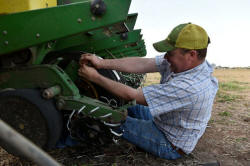Farmers worldwide struggle with rising fuel costs
 Send a link to a friend
Send a link to a friend
 [May 18, 2018]
By Stephanie Kelly and Tom Polansek [May 18, 2018]
By Stephanie Kelly and Tom Polansek
NEW YORK/CHICAGO (Reuters) - Farmers
worldwide are feeling the pinch as fuel costs rise to near four-year
highs just as they plant and harvest their fields, eroding agricultural
income already hamstrung by depressed crop prices.
The agricultural sector from the United States to Russia, and Brazil to
Europe, is seeing profits harmed by the rise in diesel prices. The
global oil benchmark, Brent crude <LCOc1>, touched $80 a barrel for the
first time since late 2014 on Thursday.
Coupled with local economic issues, the increase is making it even
harder for many farmers worldwide to turn a profit in the estimated $2.4
trillion agriculture industry, casting a cloud over future investments.

In the United States, fuel accounts for about five percent of farmers'
overall costs, and is hurting margins at a time when farm income is
already half that of 2013. Massive harvests have depressed prices of
staples such as corn, wheat and soybeans.
Diesel fuel is essential for planting, harvesting, and shipping crops to
market. In the United States, farmers will spend an estimated $15.25
billion on fuel and oil in 2018, an 8 percent increase from 2017, U.S.
Department of Agriculture data showed.
The price of ultra-low sulfur diesel used for farming equipment and
transporting crops has not been this high in May since 2014. Heating oil
futures, the proxy for ultra-low sulfur diesel, traded at $2.29 a gallon
on Thursday.
Ron Heck, who grows soybeans in Perry, Iowa, said his fuel costs could
go up $1,000 to $2,000 during the northern hemisphere's spring.
"You feel the pain right away," Heck said.
In Russia, fuel prices for farmers are up 50 percent compared with a
year ago, Arkady Zlochevsky, the head of Russia's Grain Union, a
non-governmental farm lobby, told Reuters. Farmers will need to spend
more ahead of harvesting, which starts in about a month in Russia, he
said.
For a graphic on farmers' cash expenses, click https://tmsnrt.rs/2rXHHQf
FINANCIAL STRESS
U.S. farms are also factoring in potential losses of income due to a 25
percent tax China announced on major American imports following the U.S.
government's decision to slap duties on steel and aluminum.
"We're seeing financial stress occurring in agriculture that we probably
haven't seen for a decade or so," said Scott Brown, director of
strategic partnerships at the University of Missouri's College of
Agriculture, Food and Natural Resources. "If diesel prices continue to
go higher, it continues to put more pressure on [farmers]."
[to top of second column] |

Cotton Farmer Drew Malchoff works to replace a flat tire on a
planting implement in Wakita, Oklahoma, U.S., May 11, 2018.
REUTERS/Nick Oxford

Net farm income is forecast to fall to $59.5 billion in 2018, an 8.3 percent
decline from 2017, according to the USDA. It has fallen by 55 percent since
2013.
In Holly Grove, Arkansas, Tim Gannon paid about $17,000 in February to fill a
7,500-gallon tank with diesel used to run equipment and irrigation. The price
increase means it may cost up to 25 percent more, or an extra $4,000, to refill
it in coming weeks, he said.
"That's a fairly significant amount of income to lose," he said. Gannon has been
taking steps to cut his diesel costs over the past year by reducing the number
of times he plows, or tills.
In Brazil, farmers are also taking steps to deal with higher costs, as diesel
prices have climbed 43 percent in the country since July 2017. Eder Ferreira
Bueno, a farmer in grain state Mato Grosso, said increased fuel costs meant he
had "no other option but to spend less to treat the soil." Other farmers might
hire fewer workers or delay investment plans, he added.
In neighboring Argentina, the top shipper of soybean meal and oil worldwide,
farmers are having to deal with a weakening currency at the same time fuel costs
are rising.
"Where the impact is felt greatest is in trucking costs. We are already at a
disadvantage when compared to our competitors on freight costs within
Argentina," said David Hughes, a farmer in Buenos Aires province and president
of Argentine wheat industry chamber Argentrigo.
In Europe, French grain producers say rising oil costs may have a knock-on
effect on fertilizers and crop protection products.
"It comes at a time when things are already difficult for farmers economically,"
said Philippe Pinta, head of grain growers group AGPB in Paris.

Wamego, Kansas, farmer Glenn Brunkow said he may lock in diesel prices in
advance for the first time ever next year, to avoid the pain of future
increases.
"You just kind of all of a sudden realize, 'Wow, it's pretty high,'" he said.
(Reporting by Stephanie Kelly in New York and Tom Polansek in Chicago;
additional reporting by Sybille de La Hamaide and Valerie Parent in Paris,
Polina Devitt in Moscow, Ana Mano and Marcelo Teixeira in Sao Paulo, and Hugh
Bronstein in Buenos Aires, Editing by Rosalba O'Brien)
[© 2018 Thomson Reuters. All rights
reserved.] Copyright 2018 Reuters. All rights reserved. This material may not be published,
broadcast, rewritten or redistributed.
Thompson Reuters is solely responsible for this content. |